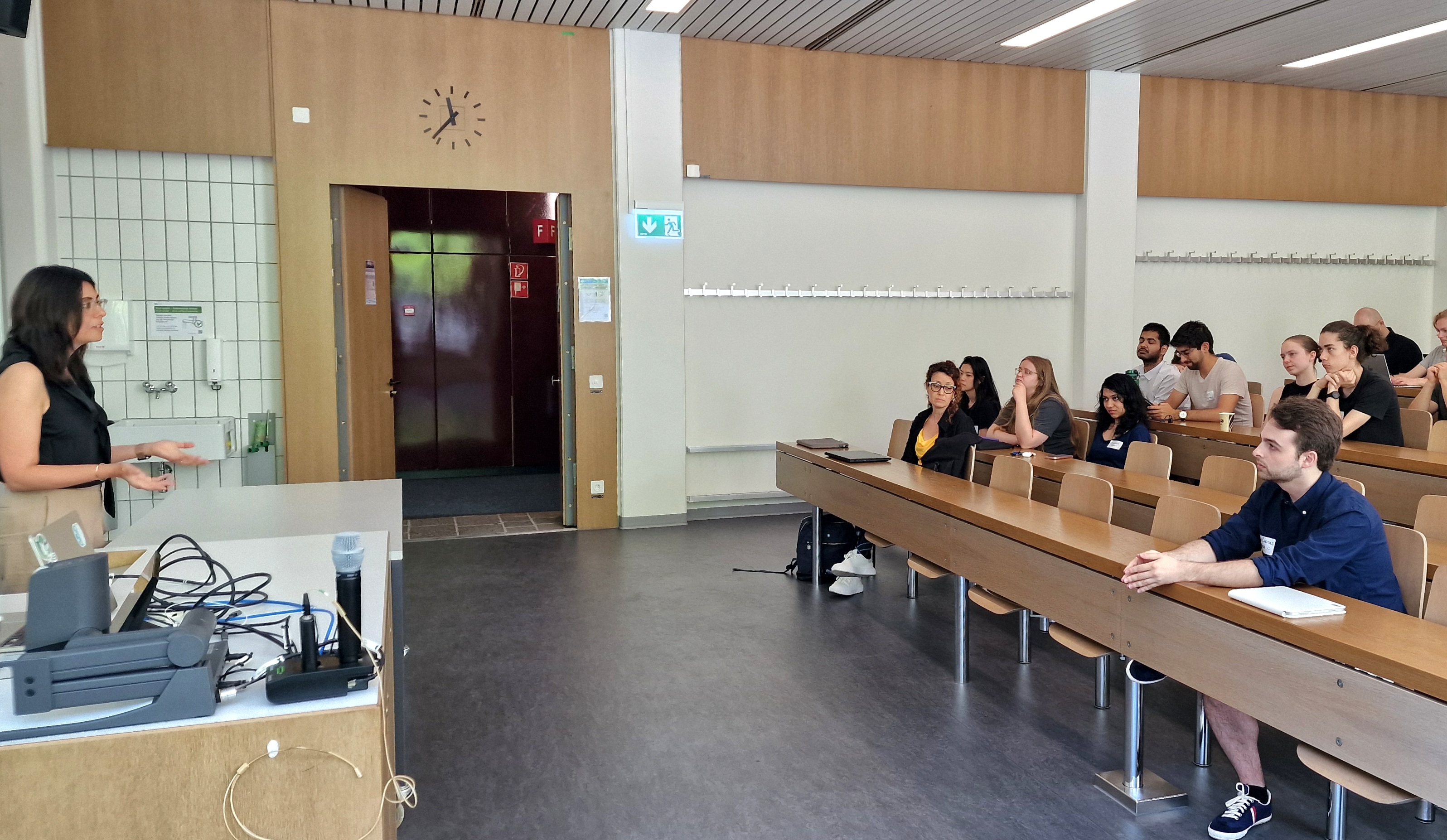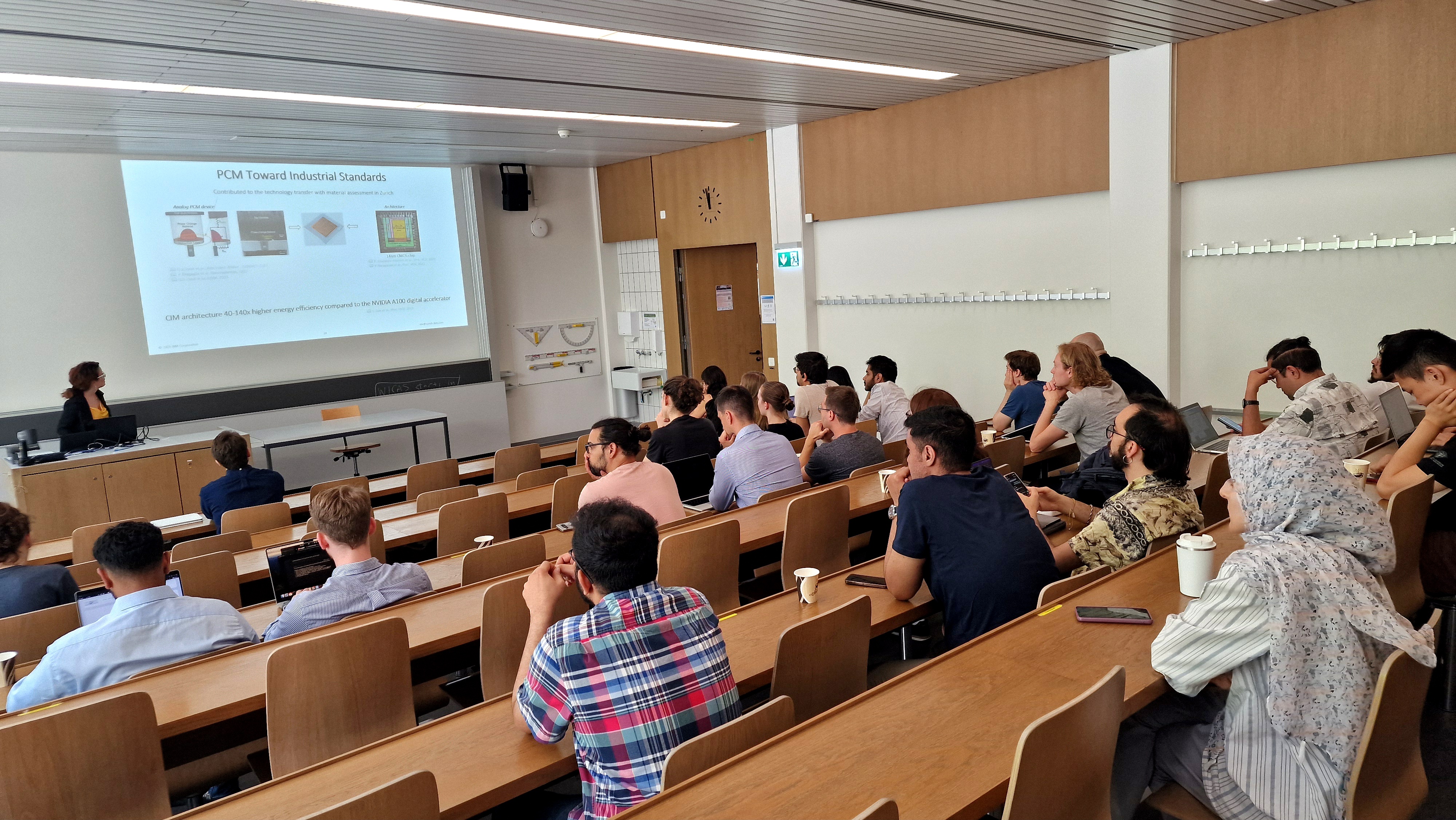3rd IEEE Swiss WiCAS/ED symposium // Career talks : CAS/ED for AI // Poster & Lunch
Impressions:
Thank you for your participation !
-----
On Friday June 20th, 2025 the Swiss chapter of the IEEE Circuits and Systems and Electron Devices Societies, and the Neuromorphic Electronics with Oxides Lab at the Departement of Information Technology and Electrical Engineering of ETH Zürich will host the:
3rd IEEE Swiss WiCAS/ED symposium // Career talks : CAS/ED for AI // Poster & Lunch
Two inspiring researchers will present their journey through industry and academia. Then during a networking lunch event, you will present your research and learn about exciting projects accross posters and demos. The event is open to all.
Registration + Poster & Demo
Vegetarian lunch and attendance is free, but registration is required. If you are not a IEEE member (yet) you can register as a guest.
Please specify if you would like to present a poster or a demo (limited number of spots), even if your research topic is not directly related to AI. We welcome any topics on Circuits and Systems or Electron Devices.
Agenda
10:15 - Welcome coffee and poster installation in ETZ foyer (E floor)
In lecture hall ETZ E6:
11:00 - Presentation EDS/CAS technical activities
11:20 - Career talk - academia, Prof. Melika Payvand (Institute of Neuroinformatics, University of Zürich)
11:40 - Career talk - industry, Prof. Valeria Bragaglia (IBM Research Zürich)
12:00 to 14:00 - vegetarian buffet lunch and poster session in ETZ foyer
Location
ETH Zürich, D-ITET, ETZ building, Gloriastrasse 35, 8092 Zürich, tram stop "Voltastrasse"
Previous Swiss CAD / ED events:
- 2024 IEEE WiCAS &YP Networking Lunch
-
2024 IEEE Swiss CAS/ED Sponsored Lecture by Dr. Kwabena Boahen
-
2021 IEEE SWISS CAS Distinguished Lecture by Prof. Keshab K. Parthi
-
2014 IEEE Swiss CAS/ED Workshop on Memristive Devices and Neuromorphic Applications
-
2011: IEEE Swiss Image and Vision Sensors Workshop (SIVS 2011)
Date and Time
Location
Hosts
Registration
-
 Add Event to Calendar
Add Event to Calendar
- Gloriastrasse 35
- D-ITET
- Zürich, Switzerland
- Switzerland 8092
- Building: ETZ
- Room Number: Foyer and Lecture Hall ETZ E6
- Contact Event Host
-
Prof. Dr. Laura Bégon-Lours
ETH Zürich
Dept. of Information Technology and Electrical Engineering
Integrated Systems Laboratory – NEO
- Co-sponsored by IEEE CAS
Speakers
Melika Payvand
Prof. Melika Payvand is an Assistant Professor at the Institute of Neuroinformatics, University of Zurich and ETH Zurich, where she leads the Emerging Intelligent Substrates lab. She received mer MSc and PhD degrees in Electrical and Computer Engineering from the University of California, Santa Barbara, in 2012 and 2016, respectively.
Her research focuses on understanding natural intelligence and implementing its organizing principles in silico to develop efficient artificial intelligence (AI) systems. She is particularly fascinated by how various structures in the brain, from micro to macro scale, give rise to function. This fascination drives her work on hierarchical structures and their potential to reduce the cost of training and operating AI systems. Specifically, she explores novel memory technologies, such as memristive devices, which change their structure based on the history of inputs and are promising candidates for developing «emergent» intelligent systems.
Melika Payvand is honored to have received the prestigious 2023 Swiss National Science Foundation Starting Grant. Additionally, she is an active member of the neuromorphic community. She has co-coordinated the European project NEUROTECH, co-chaired the International Conference on Neuromorphic Systems (ICONS), and co-organized the scientific program of the Capocaccia Neuromorphic Intelligence workshop from 2019 to 2023. She is also the chair-elect of the Neural Systems and Applications of the IEEE Circuits and Systems Society.
Valeria Bragaglia
Dr. Valeria Bragaglia is a physicist specialized in condensed matter, focusing on developing materials and devices for next-generation computing. Since 2020, she has been a permanent Research Scientist in the Neuromorphic Devices and Systems at IBM Research-Zurich, where she joined as a Post-doctoral Researcher in February 2018.
Her current research centers on hardware implementations of brain-inspired computing concepts for efficient learning and problem solving. She is responsible for advancing materials and tuning their physical properties to build high-performance devices and circuit architectures, such as networks of memristors. Her technology portfolio includes Oxide-based Resistive RAM (ReRAM) and Oscillators, Phase Change Memories (PCM), Ferroelectric RAM, and Electrochemical RAM (ECRAM). She is currently leading the efforts on ReRAM development, encompassing thin film growth, characterization, and integration into novel devices and circuits that exploit these materials' unique properties.
In 2024, Dr. Bragaglia was honored with the CNR-IMM Early Career Award in recognition of her significant advancements in material science and analog memories, groundbreaking contributions to analog neuromorphic computing, and exemplary leadership in interdisciplinary innovation.
In addition to her research, Dr. Bragaglia serves as an IBM Research Outreach and Diversity Ambassador. In this role, she is actively involved in fostering collaboration across academia, industry, and society, while also promoting diversity in STEM fields.
Since November 2024, she has held a part-time Associate Professor position at Eindhoven University of Technology (TU/e) in the Faculty of Electrical Engineering, contributing to the Integrated Circuits and Nanocomputing Research Lab to advance innovations in materials and devices critical for the future of information technology.
Dr. Bragaglia earned her Master’s degree in Physics in 2013 from the University of Tor Vergata in Rome (Italy). During her final year, she conducted research at the Paul-Drude Institute for Solid State Electronics in Berlin (Germany) on phase change materials for memory applications, which became the basis of her master’s thesis.
In 2017, she obtained her Ph.D. in Physics from the Humboldt University in Berlin, working jointly at the Paul-Drude Institute and Helmholtz-Zentrum Berlin für Materialien und Energie (BESSYII). Her Ph.D. thesis focused on the epitaxial growth and ultrafast dynamic investigations of GeSbTe alloys and GeTe/Sb2Te3 superlattices.





